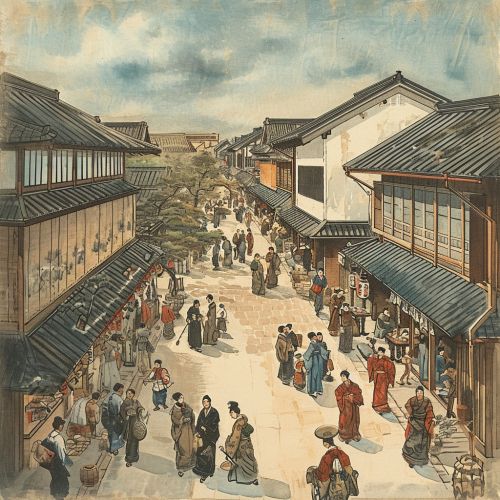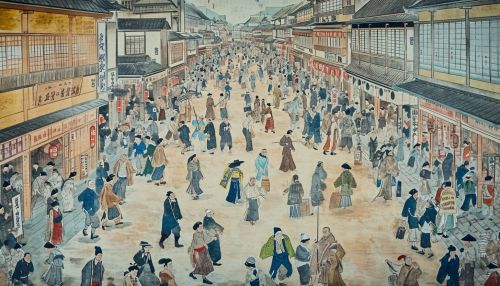Chōnin
Chōnin
Chōnin were the urban merchant class in Edo period Japan, a demographic that played a key role in the country's social and economic development. This class of people emerged during the 17th century and continued to influence Japanese society until the late 19th century.


Origins and Definition
The term "chōnin" is derived from two Japanese words: "chō" meaning town, and "nin" meaning person. Thus, chōnin can be loosely translated as "townspeople". However, the term has a more specific connotation in the context of Edo period Japan. It refers to the class of people who were engaged in commerce and industry, a group that was distinct from the samurai, farmer, and artisan classes.
Social Status
The chōnin occupied a unique position in the social hierarchy of Edo period Japan. They were technically below the samurai in status, but their economic power often allowed them to exert significant influence. The wealth of the chōnin came from their involvement in trade and industry, sectors that flourished due to the peace and stability of the Edo period.
Economic Influence
The chōnin were instrumental in the development of Japan's economy during the Edo period. Their businesses contributed to the growth of urban centers, particularly Edo (modern-day Tokyo), Osaka, and Kyoto. The chōnin were also responsible for the spread of a cash economy, as they often dealt in money rather than goods or services.
Cultural Contributions
In addition to their economic influence, the chōnin also made significant cultural contributions. They were patrons of the arts and were responsible for the development of many forms of popular entertainment, such as kabuki theater and ukiyo-e woodblock prints. The chōnin also played a key role in the spread of literacy and education, as they valued these skills for their business activities.
Decline and Legacy
The chōnin class began to decline with the advent of the Meiji Restoration in 1868, which saw the abolition of the feudal system. Despite this, the legacy of the chōnin can still be seen in modern Japan. Their entrepreneurial spirit and emphasis on education have been key factors in Japan's economic success in the 20th and 21st centuries.
